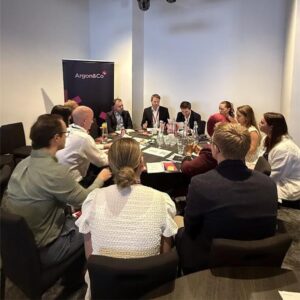Last week our UK Food and drink and Sustainability teams attended Eco Foods 2025. The conference was hosted by Arena International, bringing together leaders from across the food and beverage industry to explore how businesses can drive sustainable transformation while remaining competitive.
The conference focused on some of the most pressing challenges and opportunities facing the food sector today, including plastic reduction, decarbonisation, crop diversity, and the critical role of data in driving sustainability initiatives.
Here are our key takeaways from the conference:
Time to act on ultra-processed foods and plastic: A thought-provoking discussion highlighted that 50% of the UK’s calories now come from ultra-processed foods. Shockingly, research also shows that, on average, every adult has the equivalent of a plastic spoon in their brain, underlining the urgency to act on reducing both plastic consumption and ultra-processed food reliance
The importance of crop diversity: Today, 50% of UK caloric intake comes from just three crops, posing risks to food security and ecosystem resilience. The event emphasised the importance of diversifying and discussed benefits of vertical farming
Decarbonising operations while remaining competitive: There were detailed discussions about how businesses can reduce emissions across their value chains—both upstream and downstream. Examples include: transitioning to renewable energy sources, selecting the right refrigerants, and embedding decarbonisation into operational strategy without compromising competitiveness
Data as an enabler for sustainability: Reliable data is becoming fundamental in understanding product-level carbon footprints and the wider environmental impact. Businesses are increasingly investing in tools and systems to improve visibility and accuracy in reporting
Our UK Partner and Food and drink specialist, James Watson, hosted an interactive roundtable discussion focused on practical steps to reduce food waste within supply chains. Participants explored Argon & Co’s food waste reduction framework, which is structured around three key steps: 1) Identify, 2) Prioritise, 3) Act.
The participants shared the common challenges businesses face when implementing food waste reduction initiatives, including:
- Difficulties in accurately reporting food waste
- Minor labelling or product changes that result in unnecessary waste
- Production process failures leading to unintended losses
- The challenge of valorising by-products effectively
- Engaging teams across different sites, campuses, and countries
- Shifting mindsets on what counts as ‘waste’
- Navigating quality limitations and diverse product requirements
The event provided a valuable platform for industry leaders to share insights, challenges, and solutions on the path to a more sustainable food system. We were proud to contribute to these important conversations and look forward to continuing our work in helping clients drive sustainable change.



